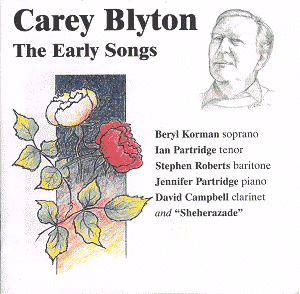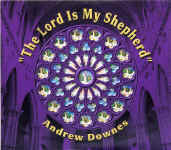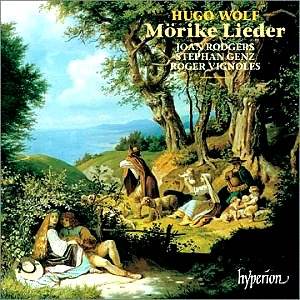 Composer: Carey Blyton
Composer: Carey Blyton
Works: Three A.M. Op. 9, Two Pensive Songs Op. 10, Toi et Moi Op. 11, Moresques Op. 14, Symphony in Yellow Op. 15, The Poetry of Dress Op. 25, What then is Love? Op. 26, The Sea Dog’s Song Op. 28, Prayers from the Ark Op. 48, The Flea Op. 100½, The Rose and the Nightingale (arr. Rimsky-Korsakov) by Blyton, Indigo Blues Op. 103½
Performers: Beryl Korman (soprano), Ian Partridge (tenor), Stephen Roberts (piano), Jennifer Partridge (piano), David Campbell (clarinet), “Scheherazade”
Recording: Recorded at Snape, Maltings, November 2000
Label: UPBEAT URCD 160
Carey Blyton’s “The Early Songs” presents a compelling entry into the canon of British vocal music, showcasing the rich tapestry of his early works alongside more recent compositions. Blyton, whose talent blossomed in the post-war era, embodies a unique voice that straddles both the traditional and the innovative within the English art song tradition. This collection, while not strictly comprised of early compositions, vividly illustrates his development as a composer and his ability to synthesize poetic text with musical nuance.
The performances here are commendable, particularly those by soprano Beryl Korman and tenor Ian Partridge. Both deliver their parts with a palpable sense of engagement and interpretative depth. Korman’s voice possesses a shimmering quality that illuminates the text, particularly in “Toi et Moi,” where she navigates the intricate harmonic progressions with grace. Partridge, meanwhile, brings a warmth and lyricism to “Three A.M.” that underlines the emotional complexity of the lyrics, revealing the inherent melancholy that runs throughout Blyton’s settings. The piano accompaniments, handled deftly by both Stephen Roberts and Jennifer Partridge, are a testament to the composer’s understanding of textural balance; their playing supports the vocal lines without overpowering them, thus achieving a delicate equilibrium.
Technically, the recording excels in clarity and detail, allowing the listener to appreciate the subtlety of Blyton’s orchestration and the interplay between voice and piano. Each song is recorded with a remarkable fidelity, ensuring that the nuances of dynamic shading and articulation are preserved. The engineering captures the resonance of the Snape Maltings, adding a layer of warmth that enhances the overall listening experience.
One notable work, “Prayers from the Ark,” stands out for its imaginative settings of animal-themed poetry. Blyton’s ability to convey character through music is masterfully demonstrated here, particularly in the contrasting musical gestures employed for the bored Old Ox and the spirited Lark. This cycle exemplifies his skill in melding text and music, creating a vivid soundscape that reflects the essence of the poetry. Similarly, “Moresques,” with its intricate instrumentation for soprano, flute, harp, and piano, reveals Blyton’s flair for color and texture, inviting the listener into a world that is both enchanting and sophisticated.
This collection also includes more recent pieces like “Indigo Blues,” which resonate with a political undercurrent, showcasing Blyton’s ability to evolve as a composer while maintaining the core of his artistic identity. The inclusion of the arrangement of Rimsky-Korsakov’s “The Rose and the Nightingale” serves not only as a nod to his influences but also as a demonstration of his adeptness at reinterpreting existing works, a quality that adds another layer of interest to this recording.
Carey Blyton’s “The Early Songs” is a testament to his unique contribution to the landscape of English vocal music. The performances are vibrant and insightful, revealing layers of emotional depth and technical prowess. The recording quality is exceptional, allowing for a rich auditory experience that captures the essence of Blyton’s artistry. As such, this CD is an essential addition to the libraries of those who appreciate the nuanced interplay of text and music, as well as the ongoing evolution of British art song.



